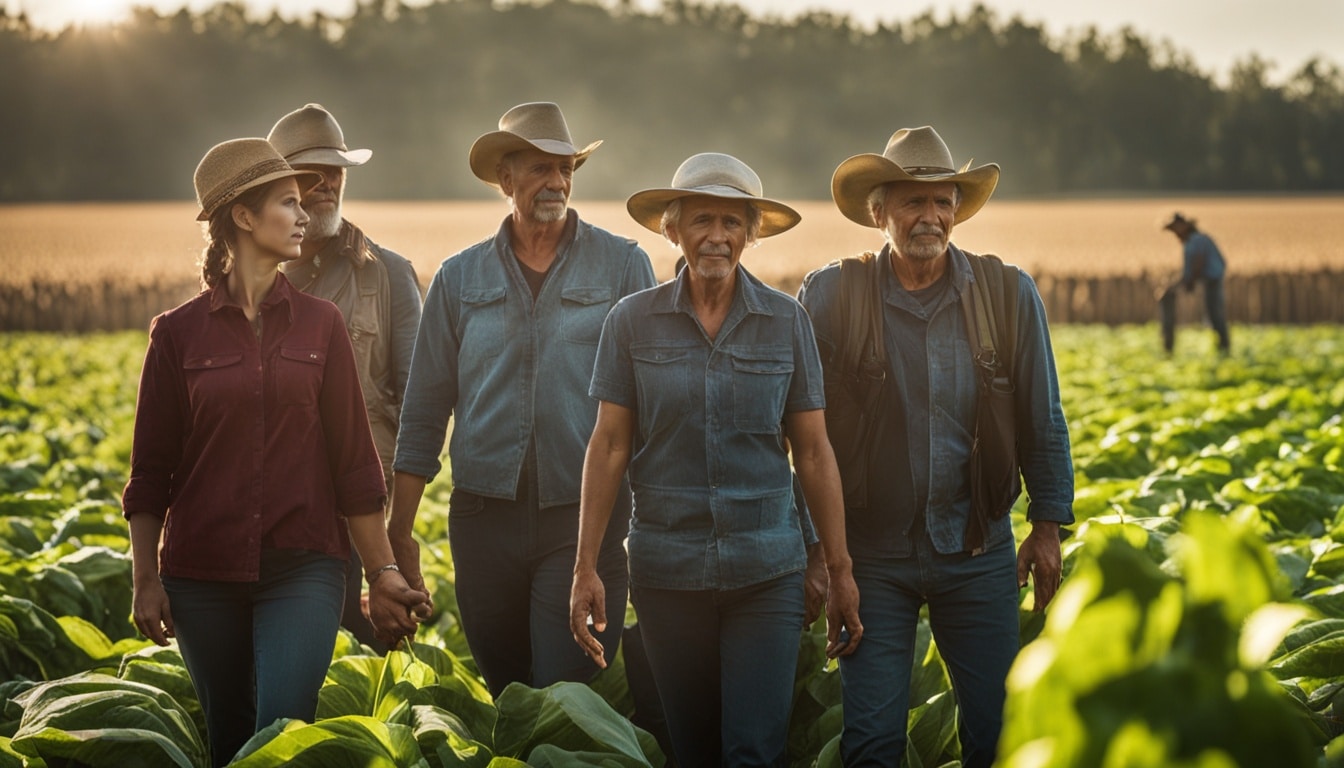Menu

Did you know male farmers and ranchers in the U.S. had a suicide rate of 43.2 per 100,000 in 2016? This was much more than the 27.4 per 100,000 in other jobs for the same age group. It shows a big problem with mental health in farming areas. Farmers face jobs with a lot of financial worry and they deal with tough times in the environment. All this can lead to a lot of stress.
Efforts to prevent farmer suicide are very important. Support groups like the Farm Aid Hotline, the 988 Suicide and Crisis Lifeline, and 2-1-1 are very necessary. These are places where farmers can get help in tough times. With mental health problems increasing in farming areas, we need to do more. We must make sure these efforts help lower the high rate of suicides among farmers.
Farmers face many mental health challenges that are complex and varied. It’s vital to understand and deal with these problems to help farmers. This includes the stress in their lives and the need for programmes that support rural communities.
The nature of farming brings a lot of stress, like from market changes and natural disasters. In 2016, the U.S. saw a high suicide rate among male farmers compared to other jobs. Things like market prices changing and not enough workers can make this stress worse. The use of pesticides can also increase the risk of mental issues, showing the need for mental health help.
Economic and environmental issues are closely tied to farming. A study found that farm operators had higher suicide rates from 1992 to 2010. Things like bad market prices and natural disasters can hurt financially. This stress can lead to heart problems and high blood pressure, which are common in the farming community.
Feelings of isolation can really affect farmers’ mental health. The COVID-19 pandemic made this worse, limiting chances for socialising. Working in agriculture can really take a toll, with many workers facing mental health problems. Rural areas often see more mental illness than cities. It shows that we need programmes that help farmers connect and get mental health support.
| Category | Statistic |
|---|---|
| Suicide Rate Among Male Farmers (2016) | 43.2 per 100,000 |
| Suicide Rate Among Other Male Working-aged Adults (2016) | 27.4 per 100,000 |
| Higher Risk of Neuropsychological Symptoms from Pesticides | 74% |
| Depressive Symptoms Among Iowa and Colorado Farmers | 37.4% |
| High Psychological Distress Among Australian Farmers | 16% |
Helping farmers with their mental health needs a full approach. It should include helping financially, managing the environment, and strong communities. Joining rural well-being projects can really help people in farming. Mental health care for farmers is very important for their overall health and wellbeing.
Farmers deal with many mental health challenges. They face economic threats and harsh environments. A study by the Journal of Rural Health found farm operators have a higher suicide risk. This shows why mental health support is crucial for farmers.

Farmers often struggle to find mental health services in the countryside. Studies show mental illness is more common in rural than urban areas. This gap means there’s a big need for better mental health help in the countryside. It shows why we must set up strong suicide prevention plans for these areas.
Many farmers don’t get help due to mental health stigma. The idea that men should be tough and not share their feelings is big in farming. To help them, groups like the National Farmers Union’s Farm Crisis Center are key. They work to break down these barriers, encouraging farmers to get the support they need.
Farmers often face depression and anxiety, made worse by tough weather and market changes. Having guns on farms also makes the situation more serious. This is why it’s so important to talk openly about mental health and have strong support systems in place. These steps will help make life better for rural farmers.
The agricultural community faces significant mental health challenges. In 2016, the male suicide rate among farmers and ranchers was 43.2 per 100,000, much higher than in other jobs. To help, both federal and state levels offer important agriculture stress management resources.
“Farmers and ranchers face unique stressors that necessitate tailored mental health support.”
Federal investments are enhancing mental health support for agricultural workers. For example, in FY21, the National Institute of Food and Agriculture (NIFA) granted almost $25 million for 50 projects. These projects support the Farm and Ranch Stress Assistance Network (FRSAN). State Departments of Agriculture (SDA) use these grants to set up essential mental health programmes.
North Dakota’s farm stress outreach has made a big impact. It aided over 3,510 people through suicide prevention efforts from 2021 to 2023. With more than 1,100 counselling sessions offered, the value of local state support for farmer mental health is evident.
States offer key resources, like Virginia’s AgriStress Helpline and Idaho’s workshops. Whether it’s financial advice or stress relief, these services are vital. They show how agriculture stress management resources are deeply integrated into community support.
The Farmers First Act of 2023 is a bipartisan effort to increase FRSAN funding to $15 million annually for five years. This act understands the importance of strengthening federal mental health resources for long-term mental health care in farming. It also plans to establish four more service centres.
States are also stepping up, with Massachusetts offering peer support training since January 2023. Over 100 farmers have undergone this training. This shows the effectiveness of state support for farmer mental health as a proactive measure against mental health issues in farming.
The focus on agriculture stress management resources, by both federal and state levels, helps build a more robust farming community. The evidence supports the urgent need for farm-specific mental health care.
Many nonprofit organisations are key for farmers and ranchers who face mental health issues. They offer various farming mental health resources. These help to reduce stress and ensure full support is available.

The Farm Aid hotline and email services are lifelines for farmers. You can reach them at 1-800-FARM-AID for urgent help. Farm Aid’s online list shows over 750 organisations supporting U.S. farms, proving the wide welfare reach.
The National Farmers Union’s Farm Crisis Center helps farmers find services in tough times. It stresses mental health support in agriculture. This ensures farm families get the help they need.
Suicide rates are too high among farm workers, topping other jobs. The Journal of Rural Health highlights this alarming trend. The National Farmers Union and RAFI-USA step in to offer mental health resources and recovery support.
Farm Town Strong, by American Farm Bureau Federation and National Farmers Union, fights opioid abuse. This action is vital against addiction and mental health troubles. It’s part of the mental health support network in agriculture.
The Rural Resilience Online Course is a great resource. It teaches stress management and building healthy relationships. These are key skills for farmers, emphasising NGOs’ role in tailored agricultural mental health support.
| Organisation | Service Provided | Contact Information |
|---|---|---|
| Farm Aid | Hotline and Email Assistance | 1-800-FARM-AID |
| National Farmers Union | Farm Crisis Center Directory | N/A |
| Avera Health System | Farm and Rural Stress Hotline | 1-800-691-4336 |
| Farm Town Strong | Opioid Abuse Support | N/A |
In conclusion, farmers’ welfare organisations are vital for mental health in the farm sector. They provide essential support and resources. This shows how crucial mental health advocacy is for agriculture.
Implementing effective rural suicide prevention strategies is vital. Studies found a high suicide rate among farmers and ranchers in 2016 – 43.2 per 100,000. This is much higher than the 27.4 per 100,000 for male adults in other jobs.
Farm families and communities are seeing more suicides. This is often linked to economic downturns and high levels of stress. A 2018 report in the Journal of Rural Health notes that farmers have a higher risk of suicide than other workers.
Rural areas have more mental health problems than cities. This affects farmers’ physical and mental health. Farmers are more likely to suffer from depression and anxiety than others, especially men.
Bad economies and market pressures make mental health issues worse. For farmers, tough economic times increase the risk of suicide.
Best practices in farming mental health support call for a mix of services. This includes access to mental healthcare and education to fight the stigma. Close-knit community support is also crucial, especially since rural residents often lack easy access to mental health services.
Below is a detailed analysis of key suicide statistics:
| Category | Suicide Rate (Per 100,000) |
|---|---|
| Farmers and Ranchers (2016) | 43.2 |
| Male Working-Aged Adults (All Occupations) | 27.4 |
Programmes that offer mental health information and peer support are showing positive results. But, we need to do more. We must fully review these programmes to make them better. By using best practices in farming mental health support, we can provide effective, full-fledged solutions for those in agriculture.
Suicide prevention campaigns are vital for farmers and ranchers facing high suicide rates. In 2016, the rate was 43.2 per 100,000 for male farmers and ranchers in the U.S. This was much higher than the 27.4 per 100,000 for male workers in other jobs. So, efforts to support the mental health of farmers are now a top priority.

The Farm Crisis of the 1980s saw a big jump in suicides among farmers and ranchers. They often face higher suicide risk due to tough economic times, the stress of their job, and environmental issues. The Centers for Disease Control (CDC) says good mental health is key for dealing with stress and how we relate to others.
Living in rural areas brings more mental health challenges, but offers less help from behavioural health providers. Although exact data on farmer’s mental health is scarce, we know they are more at risk of depression and anxiety. With suicide rates possibly three times the national average, it’s clear more mental health support is needed.
The “Save a Shore Farmer” campaign is making a real difference. It got a $19,000 grant from the Maryland Agricultural Education and Rural Development Assistance Fund. This campaign uses billboards to direct people to a website (saveashorefarmer.org) that offers advice and help for preventing suicides. The billboards, with their message of hope, made a big impression, showing the power of raising awareness.
By sharing knowledge and fighting the stigma, these campaigns help farmers find the courage to ask for help. They provide much-needed support tailored to the challenges of farming. This is crucial for making a real change in suicide rates within the farming community.
Community support is key in helping farmers with their mental health. Farmers often face tough challenges like low prices, natural disasters, and debt. Rural mental health efforts help farmers feel less alone and more connected.
These supportive actions can lower the effects of job stress. They are more important in rural areas, where mental health issues can be worse than in cities. The MMWR report in 2020 showed a troubling suicide rate in male farmers. This points to a need for strong community ties.
Farming can be very stressful, leading to mental health problems and even suicide risk. Farmers need community support to cope and find help. Peer support and mental health resources from local communities can make a big difference.
It’s vital to offer mental health help that fits farmers’ lives and values. Education and peer support are crucial. They create a place where it’s okay to ask for help, breaking the taboo around mental health.
The mental health crisis for farmers is a big issue now. Suicide is more common among farmers and ranchers than other jobs. We need fast action to make specific and helpful plans for farming life.
For farmers, it’s important to have peers who get what they’re going through. This understanding helps with the stress and mental health challenges. By talking and helping each other, farmers feel less lonely and more hopeful.
Training people in the community to spot mental health issues is key. Friends, family, and community leaders learn to help someone showing signs of suicide. They provide initial support and encourage getting professional help. This training makes a caring community that looks out for each other.
Helping farmers cope better through resilience activities is crucial. Teaching them about dealing with money, tough weather, and mental health is important. These skills help them handle pressure better, making their work life healthier.

Making peer support, gatekeeper training, and teaching resilience are core parts of helping agricultural communities’ mental health.
| Initiative | Description | Impact |
|---|---|---|
| Peer Support Programmes | Networks of farmers providing mutual support for mental health challenges. | Reduced isolation, improved mental health. |
| Gatekeeper Training | Training individuals to identify and respond to mental health crises. | Increased vigilance, timely intervention, and support. |
| Resilience Building Activities | Workshops and training sessions to enhance coping mechanisms. | Improved stress management, healthier work environments. |
Farmer suicide is a global issue that we must tackle together. Looking at what works in different countries helps us find the best ways to support farmers. This can improve mental health for farmers everywhere.
Australia is leading in efforts to prevent farmer suicide. They use both education about mental health and farmer-to-farmer support. This aims to stop the shame around mental health for farmers. The country has special services like the Rural Adversity Mental Health Program (RAMHP) to help rural areas.
They also use telehealth to make mental health care easier to reach. These methods have been quite successful. They could be a great model for other nations.
In Europe, many programs are fighting farmer suicide too. Norway found that farmers often face more depression and anxiety. This led to special support programs being made for them.
France, for example, has a system to watch over farmers’ mental health and help when needed. The European Union also supports farmers financially. This helps reduce the stress on farmers.
Through this, Europe offers ideas on how to improve mental health care for farmers around the world.
Global efforts against farmer suicide focus on teaching about mental health, easy access to care, and strong community support. Implementing these strategies can lessen the burden on farmers’ mental health. It can be a guide for every country dealing with this issue.
Technology is changing how we support mental health, especially in farming. Many farmers face mental health issues and high stress. They struggle to get help because they work in remote areas with few mental health professionals around.

In 2016, the suicide rate for male farmers and ranchers was 43.2 per 100,000, much higher than the 27.4 for men in all jobs. This shows we really need to use technology for mental health support.
Now, we can get mental health help from far away using our phones or computers. The COVID-19 pandemic made this even more important, with a 79% increase in online mental health visits for men. Online help like apps is also good at reducing thoughts about suicide.
By using tech, we can help farmers where physical health places aren’t available. Apps and websites with counselling can be a huge help for those dealing with stress and anxiety. This way, more farmers can get the help they need.
It’s also key to study how different mental health tech helps men and women who farm. Knowing what each group needs will help create better digital tools. This will improve mental health support for farming communities.
Farmers face tough mental health problems, especially during tough times. Emergency hotlines are crucial for quick help. For example, Texas has a helpline for farmers and their families. It started in February and has received 60 calls already. This shows how much farmers need this kind of support.
Farmers and ranchers often deal with serious mental health issues. In 2016, the suicide rate for men in this group was 43.2 per 100,000. This is much higher than the 27.4 for men in other jobs. It’s clear that farmers need special mental health services.
Special helplines for farmers are run by over 250 experts. They deal with the unique stresses of farm life. They help with financial worries or weather problems. These services are a vital lifeline for farmers and their families.
With suicide a major concern in the U.S. and rural areas seeing high increases, help for farmers is critical. Rural areas have more ER visits for self-harm. This shows the important role of emergency hotlines for farmers. They can offer life-saving help.
The following table further illustrates the critical need for emergency mental health services within the farming community:
| Statistics | Details |
|---|---|
| Male Suicide Rate (Farmers and Ranchers) | 43.2 per 100,000 |
| Male Suicide Rate (Working-aged Adults) | 27.4 per 100,000 |
| Suicide Rates in Rural Communities | Increased by 46% |
| Emergency Room Visits for Self-harm (Rural Residents) | 1.5 times higher than urban residents |
Training healthcare workers to help those in the countryside is very important. They need to be well-prepared, especially with the tough mental health issues that farmers and ranchers face. The suicide rate was much higher for folks in farming and ranching in 2016.

Research from 1992 to 2010 shows that people working on farms often faced a higher risk of suicide. With mental illnesses being more common in rural places, support is truly needed. This was highlighted in a 2017 publication by the Rural Health Research Gateway.
Farmers deal with a lot, like low prices, natural disasters, and increasing debt. Programs from Farm Credit and the American Farm Bureau Federation aim to help. They teach healthcare workers how to spot when someone is struggling and how to provide support and help.
One great example is the Rural Resilience program by Farm Credit and Michigan State University. This program helps by teaching how to identify stress, how to manage it, and where to find mental health help.
Working with the AgriSafe Network, they are doing more, like adding mental health checks to standard medical check-ups. Helping in these ways is crucial. It improves the care given to those in rural areas. In the end, these learning programs are key in making sure mental health professionals are ready to help our countryside’s workers.
It’s key to talk about farming success stories. These stories show how farmers have dealt with mental health issues. They give hope and helpful tips to others in tough spots. Here are some great tales about beating mental health troubles in farming.
Golombiecki started seeing a counsellor after her dad died. His death left her in charge of their dairy farm. She found a counsellor who knows what farming life is like. For two years, this expert helped her handle farm stress and family issues. Their work showed how getting help early can prevent a crisis. Golombiecki’s story proves that reaching out is a great step towards better mental health.
“Having a counsellor who understands the industry made all the difference,” she said. “It allowed me to navigate the farm’s demands while taking care of my mental well-being.”
Worth, too, faced depression but reached out after his wife’s support. His story on the TransFarmation podcast sparked talk about mental health in farming. It highlights how crucial dealing with farm stress is.
It’s interesting that not all generations see mental health the same. A survey found that more millennials are open to therapy than baby boomers. But, more rural areas now have better access to counselling. Teletherapy makes help available to those in remote places.
Worth sharing his story has encouraged many farmers to get help. In an occupation where work often comes before personal health, his tale matters. It shows that seeking support is a powerful step towards better mental health in farming.
These tales stress the importance of getting help. They show how much better things can get when farmers use the help they deserve. Sharing these stories builds a stronger community by offering support and hope.
Farmers’ mental health is a growing concern. Wellness programmes are key to tackling this issue. They offer help for both the mind and body.

Health workshops in the countryside are vital for farmers’ well-being. They create a safe space for talking openly and getting advice. In 2020, a report found a high suicide rate among male farmers. These facts highlight the need for such events.
Topics like stress and money management are often discussed at these sessions. Farmers can learn important skills and connect with others facing similar challenges.
Farmers face many mental health risks due to their job. An approach that mixes traditional and natural health care is best. This ensures they get help for both their bodies and minds.
Such an approach includes medical care and emotional support. It’s important, as many farm workers suffer from depression and high suicide rates.
To sum up, farmers’ well-being is crucial, and wellness programmes can make a big difference. By using both workshops and a broad health approach, farmers can get the help they need. This leads to a healthier and happier farming community.
Looking ahead in the agricultural world, mental health support is vital. Farmers’ suicide rates, reaching 43.2 per 100,000 in 2016, are deeply concerning. They are much higher than in other working jobs, like the 27.4 per 100,000.
This indicates the urgent need to improve farmers’ well-being. Depression and anxiety are common, leading to many mental health issues. Often these are made worse by the stresses of farming.
Sean Brotherson from North Dakota State University noted how stress affects farmers’ health. It links to high rates of heart disease and hypertension in the agriculture sector.
Technology can significantly help improve farmer mental health. Online resources and telehealth can connect farmers to mental health professionals. This is crucial especially in remote areas.
It is also important to tackle the stigma around mental health in farming. Open talks about mental health issues are a step forward. For example, a national 3-digit number for farm stress can be a lifeline for farmers.
Helping farmers to build a supporting community can greatly assist their mental health. Jeff from Wisconsin highlighted the role of community theatre. It can improve well-being in rural areas. And Juliette pointed out the importance of healthy habits and support networks for farmers.
In conclusion, improving mental health in farming requires constant innovation. It needs better resource access and strong advocacy. By doing this, the agriculture community can become more supportive and resilient. This will provide farmers with the mental health care they need.
Farmers in the United States face a suicide rate about three times higher than the national average. This shows how serious mental health issues are, especially in farming. It’s urgent to create strong initiatives to prevent farmer suicide. A study from Norway, the Hordaland Health Study, highlights that farmers deal with more depression and anxiety than others. It shows clearly we need special mental health support for farmers.
Farming presents unique challenges for mental health. The job’s financial ups and downs, with the added stress of using pesticides, and the availability of guns, it’s hard on mental health. Farmers also have a strong connection to their land. This leads to a deep feeling of responsibility, which can be overwhelming.
They often live far from others, and the idea of being tough and solving problems yourself adds more pressure. This can make it hard for farmers to get the help they need. There aren’t many experts in behavioural health in rural areas. But, teaching farmers about mental health and creating support groups can really help them.
In summary, we must work hard and wisely on mental health in farming. The 43.2 per 100,000 suicide rate among male farmers in 2016 is worrying. The solution needs efforts from the government, local, and non-profit groups. Making mental health care easy to get to and not seen as something bad is key. The well-being of those who provide our food is at stake. We must keep supporting and finding new ways to help in mental health in farming.
Farmer suicide prevention initiatives help farmers deal with tough times. They provide resources and support. This aims to lower stress and stop suicides.
Farmers often battle stress due to financial and weather issues. They can feel lonely and struggle to find help. This is because mental health services are not always available in the countryside.
Farmers’ stress comes from market changes and money worries. Bad weather and farming’s unpredictable nature add to this. Stress can greatly hurt their mental health.
Issues like market changes, trade problems, and not enough workers make farming hard. Natural disasters, like droughts, also take a toll on farmers’ mental health.
Farming is often in remote areas, which can lead to feeling alone. This has gotten worse with COVID-19. Feeling cut off has made mental health worse for some farmers.
Support is key for farmers to deal with heavy stress and mental health problems. Good mental health means farmers can keep going and their farms stay strong.
It’s hard for farmers to get mental health help in the countryside. There just aren’t enough services. This lack makes their problems even harder to handle.
Erasing stigma needs talking openly and learning about mental health. This makes asking for help normal in farming communities.
There’s help like the Farm Aid Hotline and the 988 Crisis Lifeline. Specific support and mental health resources are also there for farmers’ needs.
The Farm Crisis Center, part of the National Farmers Union, gives farmers tools, guides, and a support system. They aim to reduce stress and help with mental health.
Good strategies include teaching, better mental health access, and connecting farmers to each other. These aim to fight loneliness and stress.
These campaigns help by making mental health issues more known and less feared. They show support services are there for farmers in need.
Communities help farmers feel part of something bigger. They have spaces to talk and share. This can reduce the feeling of being alone.
These programs let farmers with similar experiences help each other. Support and understanding from peers can be very important for mental health.
Training teaches people to spot when someone’s in trouble and how to help. This training is a key part in stopping suicides.
These activities give farmers skills to deal with stress. They help keep mental health strong and stop bigger problems from happening.
Australia uses education and support groups to fight farmer suicides. Their methods could be helpful for other places too.
Europe shows how support programs and local communities can make a big difference for farmers’ mental health. These ideas can help others too.
Technology reaches farmers in far places with mental health help. It’s essential because some rural areas lack health care facilities.
Hotlines like the 988 Crisis Lifeline are for quick and secret help. They play a vital part in mental health support, especially in emergencies.
Healthcare workers get special training to deal with farmers’ mental health issues. This helps them offer the best possible support.
Many tales show how support has turned farmers’ mental health around. They offer hope and advice to others in similar struggle.
Wellness activities cover both body and mind health. They make a happier and healthier community, which is good for everyone.
The future promises new ways to help with mental health, like more tech use and better access to support. This will make a big positive change for farmers.